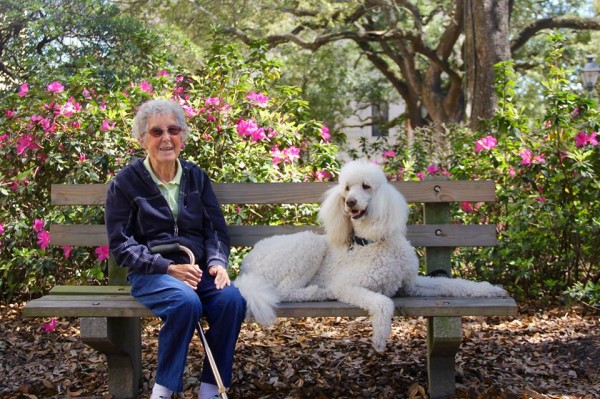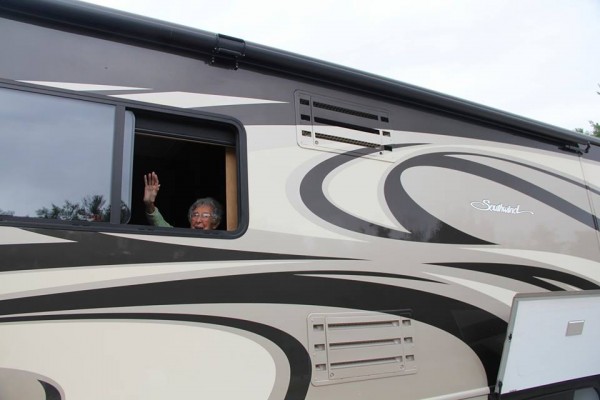Have you heard about Norma, the 90-year-old woman who was diagnosed with uterine cancer last year? She got the news the day her husband Leo was admitted to a hospice facility. And two days after he died, Norma, her son Tim and daughter-in-law Ramie listened as her doctor laid out her treatment options. Surgery, chemotherapy and radiation therapy. According to Ramie, Norma’s response was, “I’m 90-years-old, I’m hitting the road.” And so, she did. Norma lived out her life on her own terms and passed away September 30, 2016.
Ramie and Tim lived in an RV and had asked Norma if she’d like to move in with them. “Having recently read Being Mortal: Medicine and What Matters in the End by Atul Gawande (please put this on your reading list) our best idea was to take her on the road with us,” Ramie wrote on their Facebook page Driving Miss Norma. “Norma currently is not in pain, her mind is sharp, she loves to travel, and she is remarkably easy to be around.”
Two things stand out for me in Norma’s story. That she knew what she wanted (and didn’t want) and that her family understood and was on board with her decision.
End of life conversations
Last year, I interviewed Kristin Melville, the development and outreach director at Hospice of Southern Maine. The organization sponsored its annual Anne L. Hunter Memorial Thresholds Conference in May (2016). The topic was End-of-Life Conversations: What to Say and Do.
You don’t have to — in fact, you shouldn’t — wait until you are at the end of your life to have conversations about dying, said Kristin. Or to call in hospice. “One of the things we’ve learned is that when people are faced with the end of life, hospice is almost considered a last resort,” she told me. “We’re trying to educate the public that hospice isn’t the end. It’s the beginning of taking control of your own life and your own end of life care.”
That’s something my family discovered when my dad became a hospice patient seven years ago. He had some serious health issues, including chronic nerve pain that had become unbearable. When his hospice nurse suggested that he go to Gosnell Memorial Hospice House in Scarborough, I freaked out. I thought it meant he was dying. She said she thought they’d be able to get his pain under control and that it was possible he could go back home again. That’s exactly what happened.
While he was there, the team also facilitated some important conversations. My father was never eager to share his feelings, but they drew him out. Always the reporter, I took notes. One day he gave me a sideways glance and offhandedly said, “I hope you’re getting this all down, Diane.” I smile whenever I think of that moment.
Getting people to talk about death, whether it’s their own or a loved one’s, isn’t always easy. Not even for Kristin.”No one wants to talk about it, “she said. “I would want to have a conversation with my mother and she’d say, ‘Honey, don’t worry about it. I’m going to live forever.”
But we don’t live forever. And sometimes we’re faced with a serious illness and forced to make decisions we’d rather not consider. Or our families have to make them for us because we never made our wishes known.
Quality of life
Most people want to avoid suffering at the end of their days, said Kristin. They want to be with the people they love, to feel human touch. They want to be as alert as possible. And they don’t want to be a burden. But they need to share what they want with their family and with their health care providers. “People are starting to see that they have options and that they can make good choices at the end of life,” she said. “With the help of palliative care programs and hospice, they’re looking at how they can spend their last days. They’re becoming more informed about what’s happening in the medical world. They’re trying to have the best end of life experience possible.”
Physicians can now bill Medicare for discussing a terminal diagnosis, hospice care, and other end of life issues with their patients. But talking to a patient about his/her impending death may be hard for some of them. After all, their role is to save lives and if one can’t be saved, isn’t that a failure? No, said Dr. Diane Meier. She’s the director of the Center to Advance Palliative Care and she’s passionate about giving people access to palliative care.
Palliative care focuses on the quality of life for seriously ill patients and their loved ones. “This is important,” said Dr. Meier in a short video on her website, “because people are living now for many years, even decades, with serious chronic diseases and while we’re great at treating those individual diseases, we need to do more to pay attention to the person, the human being who is living with that disease and the experience of their family.”
Dr. Meier was the keynote speaker at the Thresholds conference. Her goal was to give healthcare professionals and the general public — you and me — a step by step guide on how to start the conversation about end-of-life issues.
What about you? If you found out you had a serious illness, how would you want to be treated? Maybe you’d want every medical intervention that was available. Or maybe, like Norma, you’d like to have a cross country adventure with the people you love. It’s your decision. That’s what matters.
If you’d like to learn more about palliative care, listen to this podcast I did with Dr. Meier.



Interesting read.Something we never want to think about but it is a really good idea, especially for our families. Thank you for the story.
I’m so grateful that I had conversations with my parents while they still could.They put their affairs in order and either included me or let me know their wishes. I remember going to a doctor’s appointment with my ill father when he told him he wouldn’t want any extraordinary measures taken — that he’d lived a long and good life. I nearly burst into tears, but it was important for me to hear it and to understand his reasons.
This is so, so important, Diane. I read Dr. Gawande’s book last year and got my husband to read it, too. None of us is getting out of here alive, and we really do need to make our loved ones aware of how we want to exit this life. Not talking about it doesn’t keep us from dying; it only puts a tremendous burden on those closest to us, and will likely frustrate the hell out of us if our wishes aren’t known and we’re incapable of implementing them. Great post, my friend.
Thanks, Roxanne. I am reading Being Mortal right now. I’m not sure yet what I would want if faced with a serious illness. I think it depends on what I’d be facing and also my age. But I have had a couple of conversations with my daughters about what would make me happy — painting supplies close at hand and plenty of my favorite music.
I want to express my admiration for Miss Norma…..if faced with cancer at 90, I want to do exactly as she did. If given the option of having surgery, radiation and toxins injected into me making the rest of my life (and at 90, that might not be long) totally miserable or even ending my life sooner, put me in an RV and take ME on a trip. Living our lives to the very end, in reasonable comfort, in a place we want to be with our loved ones around us is the ideal. If that means I might die on the road far from home, so be it. I can be cremated anywhere, and my remains can be transported easily. I agree with you Diane, Being Mortal is a must read. Dr Gawande highlights living, the way we want, even in long term care facilities. His book is genius.
Thanks for your comments, Kathy. To me, what’s important is having the option of living life on my terms. I think sometimes, we get caught up in trying to take care of everybody else and not ourselves. Norma is fortunate that her family listened to her and respected her wishes. Her daughter-in-law told me that they never talked about “this stuff” until Norma’s situation. They hope that their story “may provide a comfortable gateway to this conversation with loved ones.” I think it is.
When my husband was diagnosed with Stage 4 Multiple Myeloma, he would have had weeks to live if he had not tried chemotherapy. He did the chemo which extended his life by 14 months. We used that time to have many end of life discussions, including how he wanted to die. He wanted to be home until the end so we planned how we would accomplish that with the help of our PCP. He wanted to be sure he wasn’t in excruciating pain, but did not want to be rendered unconscious with morphine. We talked about my future as a soon to be widow. He wrote notes on how to do things around the house to help me cope. These were all heart rendering conversations, but it helped him die with dignity and helped me cope with his loss. More importantly, he made the decision to stop all interventions once he felt he had “wrapped things up” as he said. He died at home after spending a wonderful day with me and our beloved little dog and it all happened his way. Thank goodness for all our conversations. He would have loved Norma!!
Oh, my Linda. I could hardly catch my breath when I read your comment and then I read it out loud to my husband and it made my cry. Thank you so much for sharing your experience with us. I’m sure I will write on the topic again in the future and maybe include your story if that’s ok with you.
Thanks for sharing this important topic here and on WCSH6, Diane!
Please share our website and free, downloadable Starter Kit Guide to having “The Conversation” with your readers and conference participants. http://www.theconversationproject.org
There are guides for how to talk to your doctor, too. And a new guide coming next month for talking with people with dementia.
Great work!
Thanks, Rosemary. I will. I originally published this post in March and another reader suggested that people look into The Conversation Project, which is what I did for the spot on WCSH. I am going to post the video from the show either tonight or in the morning and will include the link there.
Much needed info, thank you.
Could you please email it to me?
Thank you so much!
Thanks! What do you want me to email you? A copy of the post?